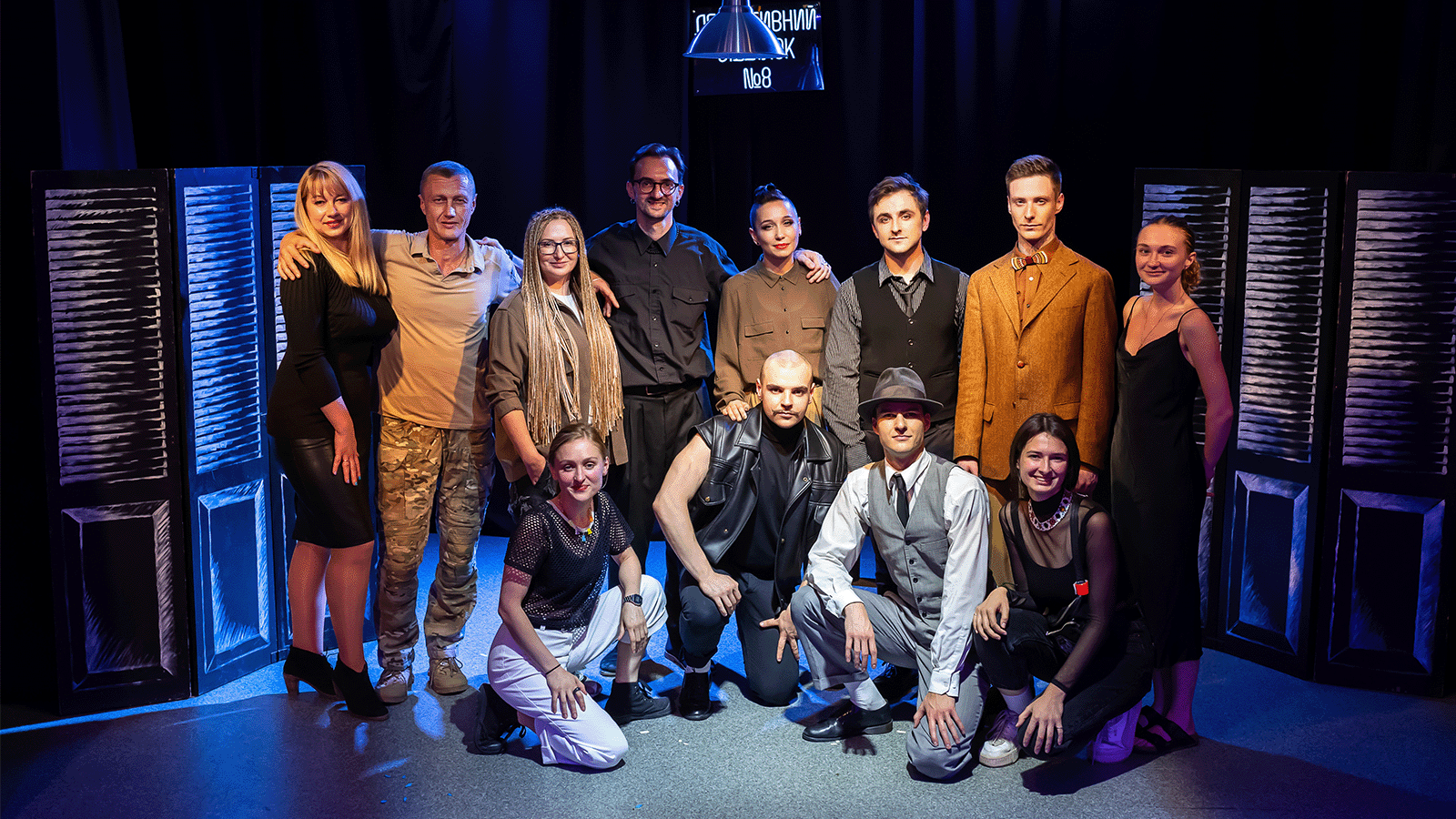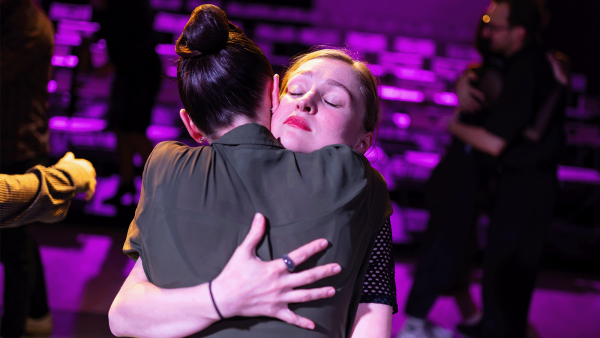
“From the very start, we envisioned our theatre as a space for exploring new forms that would involve different artists and different themes,” says Tetyana Holubova, “We see theatre as this living vibrant organism that reflects on the present and addresses the reality.”
“We don’t stay away from social life,” she adds, “Rather, we form it and bring forward the issues we want our community to address – such as reflections on the Russian war and daily life amid the dangers our city faces.”
Tetyana is the operational director of a Kharkiv theatre “Nafta”, or “Oil” in Ukrainian. The team of “Nafta” have had to overcome many adversities since the start of the Russian full-scale invasion in 2022, as Kharkiv is less than an hour away from the Russian border. The city was and remains under daily missile attacks, and many of the actors and staff had to relocate to safer parts of the country or abroad.
“We stopped our activities for a year because of the full-scale war,” Tetyana says, “We relaunched our work in 2023 with new performances and new objectives. We aim to support people who stay in Kharkiv, so they can come and have this shared cultural experience and positive emotions, and at the same time, they can see and enjoy modern Ukrainian theatre.”

“Nafta” emerged in 2018 and at its peak had 60 actors and staff members. It was launched as an artistic movement to showcase the Ukrainian identity of Kharkiv and celebrate artistic developments in the city. Kharkiv, with more than a million residents, is Ukraine’s second-largest city. However, the city’s creative sectors used to be overlooked and were an easy target for Kremlin propaganda which painted Kharkiv and its cultural scenery as Russian.
“The myths generated by Russian propaganda have been poisoning the minds of Kharkiv residents for a very long time,” Tetyana says, “At the same time, the city has a very strong community that has a clear Ukrainian identity, and this community has grown tremendously in the past few years.”
“We want to support these people. That’s why we’re building more Ukrainian-speaking spaces for these people and constructing more cultural bridges through our activities.”
The troupe experienced major setbacks throughout 2022 when many team members had to relocate, became volunteers, or joined the Ukrainian Armed Forces, and thousands of residents were forced to flee in the early days of the full-scale invasion when parts of the Kharkiv region were under occupation.
“Kharkiv was badly hit throughout the early months of the full-scale invasion,” Tetyana recalls, “Then, with Ukraine’s counteroffensive, it became a bit quieter, but in 2024, the attacks have intensified. I especially remember 27 March 2024. It’s a National Day of Theatre, so it’s very symbolic for us. That is when Russia launched guided missiles against us. Since then, the missiles come non-stop.”

The city started coming back to life in 2023 – as Ukrainian troops regained control of previously occupied areas near the city. The theatre revived, too – starting preparations for the new play in July of that year.
“We staged our first show in September 2023, and we decided to start with a comedy that wasn’t directly about the war,” Tetyana says, “Of course, it still reflected on what was happening, but we really wanted to fill people’s lives with hope and positive sensations.”
The theatre’s next shows were focused on the war experience. This included a play “The Rainbow on Saltivka” which is focused on the experience of growing up in Saltivka, a district in the city that has been massively destroyed by the war, and about life there now, amid the ongoing war. The performance also shows how the war affects artists and Ukrainian culture.
The troupe also staged a play called “Someone like me”, which is entirely based on interviews with Ukrainians who experienced the full-scale war. The interviewees range from a 6-year-olds to a 90-year-olds. It tells the stories of the soldiers, those who were wounded, and of parents with small children, and of average Kharkiv residents who live near the frontline.
“This play aims to examine how this state of permanent danger affects us, our bodies, our feelings, and our decisions,” Tetyana explains, “It helps people reflect on this reality of daily bombardment and constant insecurity.”
The people of Kharkiv try to lead normal lives, despite the non-stop attacks. Many residents carry first-aid kits whenever they go out, and all public events are organised in safe locations or in shelters.
“I don’t walk around with my headphones on now because I understand that if there are any incoming missiles, I need to be at my highest alert,” Tetyana says, “Two seconds can save a life, literally. Obviously, this is something that finds reflection in our theatre art because we all live like this.”
Working in Kharkiv remains difficult because of proximity to the frontline, and the increased dangers in the area. It can be difficult to attract audiences to attend theatre performances.
“Thanks to EED, we are finally able to think big without worrying about basic needs all the time,” she says. “EED helped us gain a sense of stability by covering some of the most pressing expenses, so we can plan for the future, work on new projects, and think how we can improve our theatre and our cultural representation of Ukraine.”
Tetyana and her team are now busy making plans. They are working on a new play about the Executed Renaissance – a mass murder of Ukrainian artists during the 1930s by the Soviets. The troupe is also preparing for a tour to different parts of Ukraine and abroad as they have been invited to perform across Europe.
Another plan is to organize a “Naftalab” – a space to connect with new actors and civil society and bring more people into the theatre work.
“We hope to train more young actors and see them among our team members in the near future,” says Tetyana, “We also want to tour more across other European countries so we can present Ukraine to the world and tell them about our culture and life in times of war. It is important for us to be able to speak for ourselves and to remind the world about the events here.
This article reflects the views of the grantees featured and does not necessarily represent the official opinion of the EED.
This initiative was supported thanks to the contribution of the European Commission to EED.